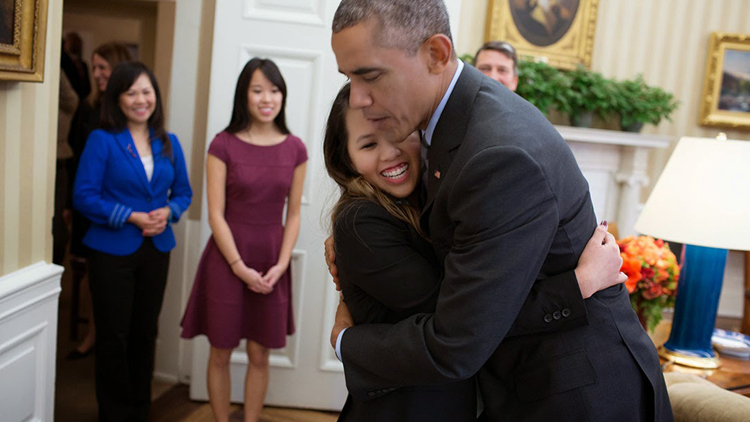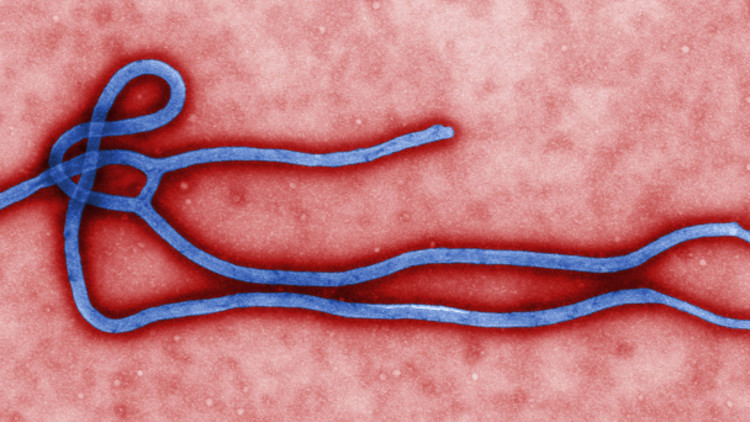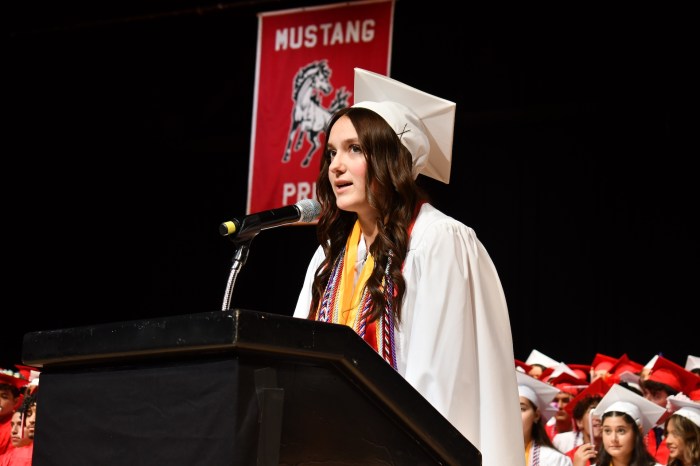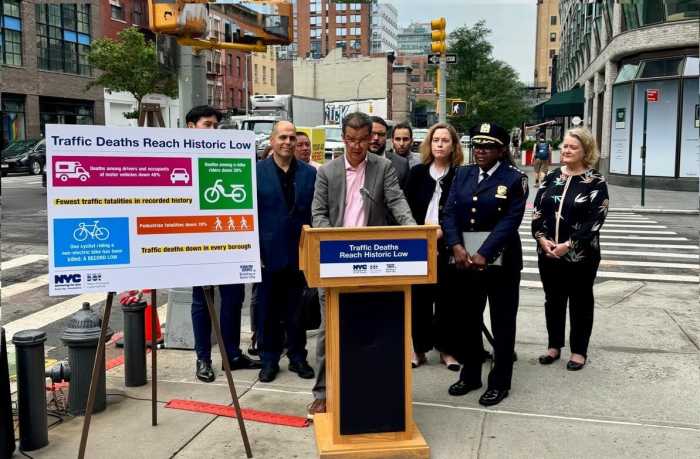New York Gov. Andrew Cuomo is defending his and New Jersey Gov. Chris Christie’s “mandatory quarantine” order for health care workers returning home from treating Ebola patients in West Africa, telling reporters during a pro-tech-education tour at Mineola Middle School Monday that he doesn’t agree with the federal government’s response to the deadly virus and, if need be, the quarantine will be enforced by law.
“I think politics be darned on this one,” he told reporters following a briefing about his proposed $2B Smart School Bond Act—which would expand tech education, including high-speed broadband connections, to classrooms across the state. “I happen to be a Democrat. The federal government happens to be run by a Democrat. I’m in disagreement with the CDC [U.S. Centers for Disease Control and Prevention]. I’m working with the Republican Chris Christie, who is my neighboring governor.
“There’s no politics here,” he continued. “This is far too important for anyone to be playing any politics. It would be the height of irresponsibility. I take this very seriously.”
The CDC does not recommend isolated quarantine unless individuals present symptoms of the virus—fever, headache, weakness, muscle pain, vomiting, diarrhea, abdominal pain, or hemorrhaging—along with a relevant exposure history. The agency recommends fever and symptoms be monitored for 21 days after the last exposure to someone infected with Ebola—21 days being the duration in which symptoms manifest.
Cuomo and Christie jointly announced those states’ additional screening protocols for John F. Kennedy and Newark Liberty international airports Friday, ordering the mandatory quarantine and twice daily, 21-day monitoring of anyone returning home who had direct contact with those infected with the Ebola virus from Liberia, Sierra Leone and Guinea—where the death toll for the current Ebola outbreak nears 5,000 from nearly 10,000 known cases.
On Sunday, Cuomo’s office released a “Fact Sheet” reiterating the mandatory quarantine but specifying those returning who were in direct contact with Ebola patients but who were asymptomatic would be quarantined in their homes and those showing no symptoms who did not have direct contact with anyone infected “would be treated on a case-by-case basis,” and “at the minimum” undergo 21-day monitoring “but these individuals would not automatically be subject to quarantine.”
Cuomo’s latest remarks came as Kaci Hickox—a nurse forcibly quarantined against her will in an isolation tent at Newark’s University Hospital upon her arrival at Newark airport Friday from treating Ebola patients in Sierra Leone—was released following symptom-free testing throughout 24 hours. She’ll now be monitored for 21 days at her home in Maine, according to published reports, while Illinois and Florida have also adopted 21-day monitoring programs for those returning from Ebola-stricken countries.
The 33-year-old blasted Christie for her detention, criticizing her isolation as not based on medical facts and her quarantine conditions as “prison” and “inhumane.”
The White House and Democratic New York City Mayor Bill de Blasio have also been critical of her treatment, stressing the selfless and important efforts health workers such as Hickox have made and continue to make in combating the deadly virus.
“We do want to ensure that whatever policies we put in place takes as the first priority the protection of the American public,” White House Press Secretary Josh Earnest told reporters during a press briefing Friday. “But at the same time, we don’t want to overly burden those individuals who are going to great lengths to try to serve their fellow man and stop this outbreak at the source, which ultimately is in the best interest of the American people.”

President Obama posed for cameras in the Oval Office that day hugging 26-year-old Dallas nurse Nina Pham, who had been in isolation since 0ct. 16, when she tested positive for Ebola after treating Liberian national Thomas Duncan, who died at Texas Health Presbyterian Hospital in Dallas Oct. 8.
Pham had been tested five different times to confirm that she no longer had the virus before meeting the president, according to Earnest.
Cuomo, at the Mineola middle school, told reporters he’d rather be cautious than risk the consequences when dealing with a virus as deadly as Ebola, adding that those quarantined can do so in the comforts of their own home—and the state will even pay for lost wages during that time.
“I disagree with the CDC’s policy—which by the way, I don’t even think put out one,” he blasted. “At the end of the day, I’m the governor of New York. We knew the problem—they haven’t even covered the protocol. But ours is more cautious. I have gone through hurricanes, floods, tornadoes, you name it the past four years, and my policy is always been hope the best but prepare for the worst.
“I also believe that what we’re asking is totally reasonable,” he continued. “All we’re saying [is] health care workers who were exposed to infected people—or citizens coming from those countries who were exposed to infected people—to have a 21-day quarantine at home. They can have their family. They can have their friends, at home. If their organization doesn’t pay them for the three weeks, the state will compensate them for the three weeks. I think that is an entirely reasonable request given the risk.”
Ebola—a rare and deadly disease caused by infection with one of several viral strains—can be spread in several ways to others, according to the CDC: “direct contact (through broken skin or mucous membranes in, for example, the eyes, nose, or mouth) with blood or body fluids (including but not limited to urine, saliva, sweat, feces, vomit, breast milk, and semen) of a person who is sick with Ebola; objects (like needles and syringes) that have been contaminated with the virus; infected fruit bats or primates (apes and monkeys).”
Ebola is not spread through the air or by water, or in general, by food, states the CDC.
Cuomo and state officials announced Oct. 16 there would be eight hospitals across New York designated to handle potential Ebola patients, two on Long Island: Stony Brook University Hospital and North Shore-LIJ’s Glen Cove hospital. The latter announced Thursday it’d also be developing a specialized biological containment unit, to be housed in one of its-yet-unnamed 16 hospitals.
“Again, I’m asking those people who were in contact with infected people to stay home for 21 days,” Cuomo reiterated Monday at Mineola Middle School. “Enjoy your friends, enjoy your family. Read a book. Read my book,” he joked.
“You don’t have to read my book, but stay at home for 21 days,” added Cuomo.” It will help keep the public calm. And if they do become infected, they’re health professionals. They would want to help make sure they limited their exposure, just in case. This accomplishes that.”
“I always believed that it was inevitable that Ebola was going to be here,” he explained. “As soon as we saw that it was in Dallas, I knew in my heart that it was just a matter of time. So we worked on these issues, we thought them through, and this is where we came out.
“Home quarantine is not an undue burden,” he insisted. “It’s not like we’re asking someone something terrible. They will have just been in Africa for a period of time—stay home with your family and friends and we’ll pay you. Some people disagree and say ‘I don’t have to stay home; I can go around the city even though I’m sick.’ To me, that is an un[necessary] risk.
“If we need, by law, we can mandate it.”





























